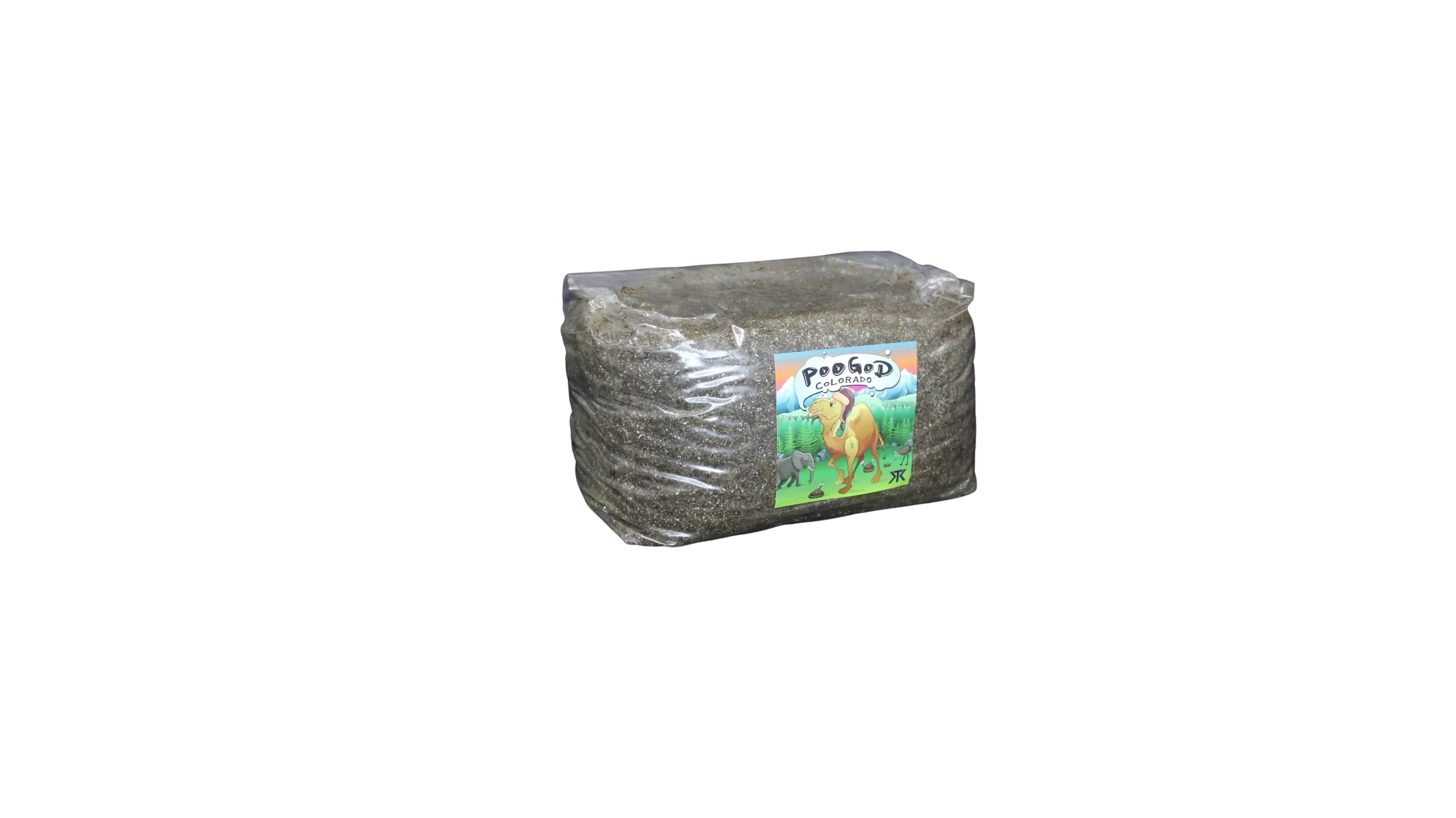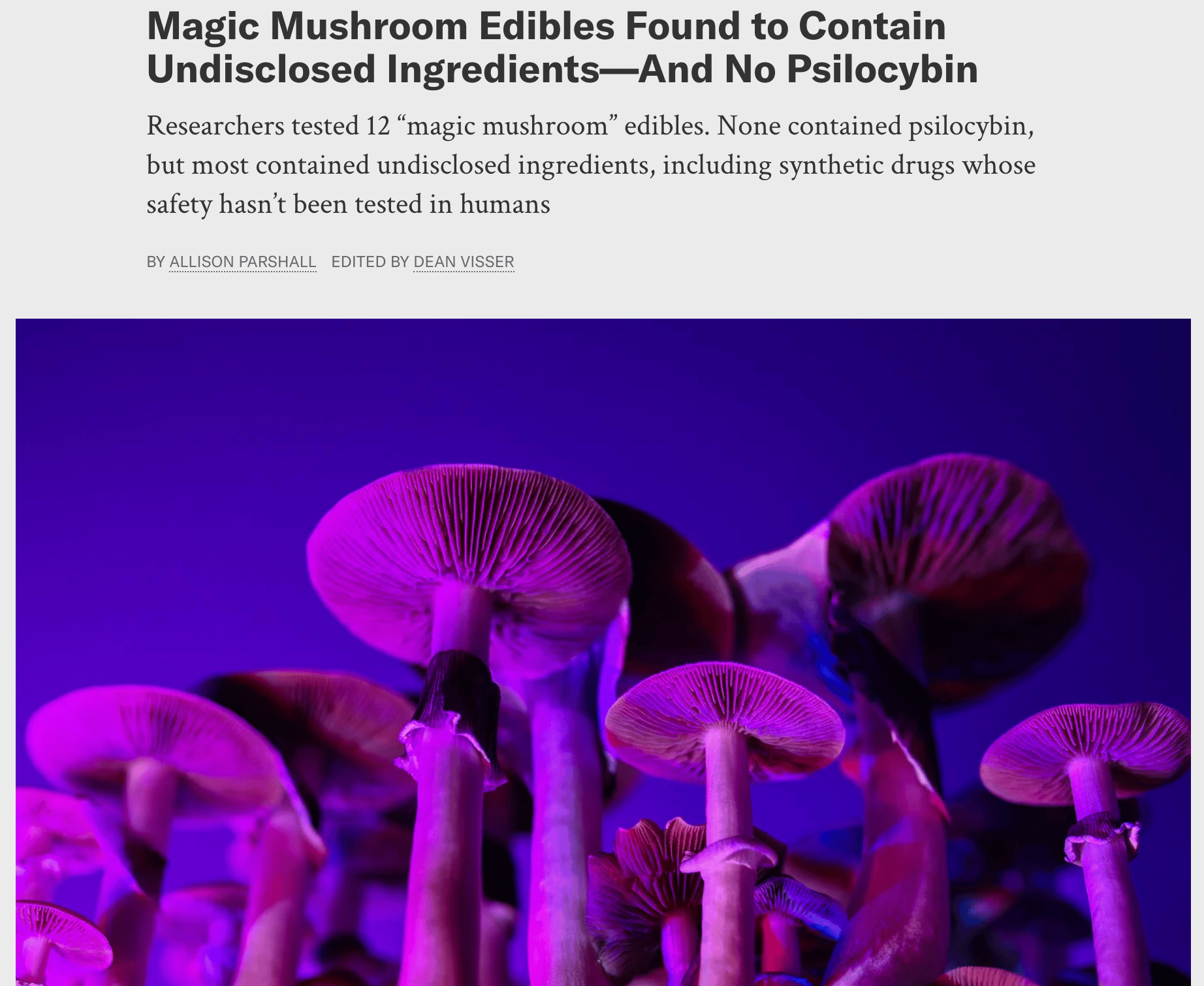
Hello and welcome to the Mycopreneur Newsletter, a twice weekly analysis of the global mushroom startup ecosystem and entrepreneurial space. Today we cover the first signs of an FDA crackdown on Amanita muscaria mushroom products, as well as mounting concern and oftentimes hyperbolic coverage of the ‘underground’ magic mushroom product landscape more broadly. We also showcase the surging trend of functional mushroom beverages around the world below that.
At the bottom of this newsletter you’ll find the invite to today’s Mycopreneur Incubator, our weekly accelerator for mushroom entrepreneurs and lean myco startups. Let’s get right down to it with a dive into the shifting regulatory & legal landscape around the vast and nebulous psychoactive mushroom products - as well as the nefarious mislabeled, misleading products that are falsely advertised as containing mushrooms.
FDA Warning Letter to Blue Forest Farms LLC 🍄
On September 11, the FDA sent a warning letter to a company producing Amanita muscaria mushroom products. Here’s the first part of the letter.
“Dear Ms. Johnson:
This is to advise you that the Food and Drug Administration (FDA) reviewed your website at the Internet address www.blueforestfarms.com in July 2025 and has determined that you take orders there for various human food products, which you represent as containing Amanita muscaria. FDA has determined that your products, Amanita Muscaria Microdose Capsules and Amanita Muscaria Magic Potion Tincture, are adulterated under section 402(f)(1)(B) of the Federal Food, Drug, and Cosmetic Act (the Act), 21 U.S.C. 342(f)(1)(B). Additionally, your Amanita Muscaria Magic Chocolate is adulterated under section 402(a)(2)(C)(i) (21 U.S.C. 342(a)(2)(C)(i)) of the Act. As explained further below, introducing or delivering these products for introduction into interstate commerce violates the Act. You can find the Act and FDA regulations through links on FDA’s home page at www.fda.gov.”
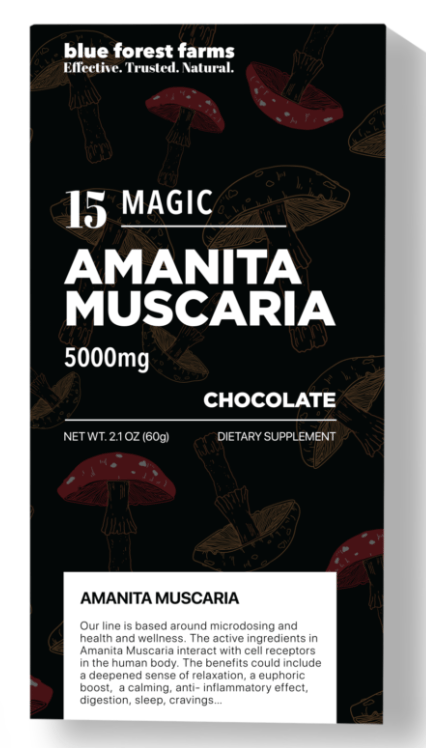
It goes on to detail each of the products listed on the Blue Forest website and their alleged violations of GRAS (Generally Recognized as Safe) standards and calls out the Amanita muscaria microdose capsules, tincture, and Amanita muscaria ‘Magic Chocolate’ and closes with the following call to action:
“Please notify FDA in writing, within 15 working days of receipt of this letter, of the specific steps you have taken to address any violations. Include an explanation of each step being taken to prevent the recurrence of violations, as well as copies of related documentation. If you cannot complete corrective actions within 15 working days, state the reason for the delay and the time within which you will do so. If you believe that your products are not in violation of the Act, include your reasoning and any supporting information for our consideration.”
This warning letter to Blue Forest Farms comes as no surprise given that the FDA published a broad waring to Amanita muscaria product purveyors at large in December of 2024, the full text of which is available here.
With the explosion of interest in mushrooms and ‘magic mushrooms’ specifically, Amanita muscaria has become more popular than ever in recent years due to the fact that it isn’t scheduled under the Controlled Substances Act like Psilocybin and Psilocin - the active alkaloids in Psilocybin mushrooms - are. It’s main psychoactive ingredient is Muscimol, which isn’t formally scheduled as an illicit compound while producing intense psychoactive effects.
This is the often befuddling reality of our drug and food laws in the U.S. and in many others around the world: Though Amanita muscaria mushrooms have been consumed by humans in numerous cultures around the world going back at least 4,000 years, the institutions in power in our modern world have officially deemed it ‘Not Generally Recognized as Safe’ for human consumption. Ironically, foods that are designated GRAS by the FDA have contributed to over 100 million cases of obesity in the U.S. in 2018 and nearly 1 million deaths via cardiovascular disease as of 2022 according to the NIH and CDC..
Furthermore, the rapid commercialization of Amanita muscaria into all manner of different brands and product types in combination with skyrocketing consumer demand for magic mushrooms has opened the door to many unscrupulous purveyors who adulterate their products with any number of unknown additives and psychoactive substances, the moral panic around which has superseded the actual utility and benefit of this ancient mushroom medicine itself in our hypermodern consumer culture.
The widely publicized ‘Diamond Shruumz’ story from last year opened the floodgates to a tremendous amount of notoriety and bad press around the ‘magic mushroom’ and ‘microdosing’ underground product categories, in which a company widely distributing a mystery research chemical and psychoactive concoction labeled as a ‘Premium Microdose Chocolate’ with a ‘Proprietary Mushroom Blend’ formulation faulted an errant concentration of Muscimol in a batch of 2 million bars as the culprit behind over 70 reported illnesses and 2 potentially associated deaths.
Another prominent example of institutional backlash against the prolific ‘grey market’ magic mushroom edible trade can be found in a report that came out this week from Oregon State University that has been published in no less than a dozen different mainstream and niche publications:

This image and headline is from Scientific American, who first broke the story.
In response to the recent press coverage of underground ‘mushroom products’, which in many cases are completely and unfairly associated with mushrooms at all considering that synthetic cannabinoids and mystery psychoactive substances are the actual ingredients in the products, Mycopreneur was provided the following statement from Rhonda DeSantis, Founder & CEO of Colorado’s first state-licensed cultivator and manufacturer of psilocybin mushrooms Psylutions
“Even when a product does actually contain psilocybin, the labeling is often completely misleading. A product labeled as 4,000 mg is typically just 4 grams of dried mushroom material—without any indication of the actual psilocybin content. This creates a dangerous and confusing disconnect, as weight alone has nothing to do with potency. True safety and precision in psychedelic medicine require accurate labeling in milligrams of active compounds, not arbitrary dry weight.
At Psylutions, our mission is to ensure that patients and consumers have access to safe, reliable, and effective psychedelic medicine. Every product we produce undergoes rigorous third-party laboratory testing and strict quality controls to confirm potency, purity, and consistency. Transparency in labeling and adherence to legal, science-backed standards are not optional—they are essential for building trust and protecting public health.
This is precisely why regulated pathways matter. Legal and responsibly developed psychedelic medicines offer patients the safeguards and confidence they deserve. Psylutions will continue to lead by example, demonstrating that innovation and integrity must go hand in hand in this emerging field.”
While I appreciate the notice to the general public surrounding adulterated mushroom products and ‘gas station gummies’ or ‘trap chocolates’ as sketchy products are pejoratively referred to among psychonauts and the myco community, it would be disingenuous not to report the fact that hundreds, if not thousands, of ethical operators are producing small batch magic mushroom edible products and straight up regular, fruiting bodies from coast to coast and internationally. A RAND Corporation report issued last year estimates that over 8 million Americans, or 3% of the population, consumed psilocybin mushrooms in 2023 which is…a MASSIVE lowball estimate, and which doesn’t account for the tens of millions of more people globally who also consumed psilocybin mushrooms. As I’ve covered extensively throughout the life of this newsletter, just go on TikTok and scroll down a mushroom content rabbit hole and you’ll count billions of views on psilocybin mushroom content from thousands, or maybe 10’s of thousands of creators who exhibit the robustness and mainstream cultural embrace of actual IRL mushroom use as opposed to highly controlled and official government sanctioned estimates.
Consider that from 2013-2022, only 6933 calls to poison control centers in the U.S. were reported for ‘psilocybin-related exposures’ from 2013-2022 and match that with the 8 million person estimate for psilocybin mushroom consumption in the U.S. in 2023 - both these numbers are from official government sources.
So when the hoopla around dangerous and unsafe mushroom products is unilaterally amplified by government and media sources in every direction possible and citing every imaginable ‘adverse incident’, it’s an incredibly one-sided narrative that completely ignores the fact that tens of millions of people safely consume mushrooms not through government and hierarchically-sanctioned pathways.
I’m not saying that we shouldn’t aspire to some from of regulation for these products…but I am calling bullshit on the moral panic and alleging irresponsibility, laziness, and flat out lack of journalistic integrity in the often syndicated reporting and copy pasta coverage of this issue.
And since we’re talking Colorado here…you can always legally grow, gather, and gift mushrooms under the generous provisions outlined by the Colorado Natural Medicine Health Act.
I’ll just leave this here for anyone interested:
A Different Kind of Mushroom Coffee in China 🇨🇳
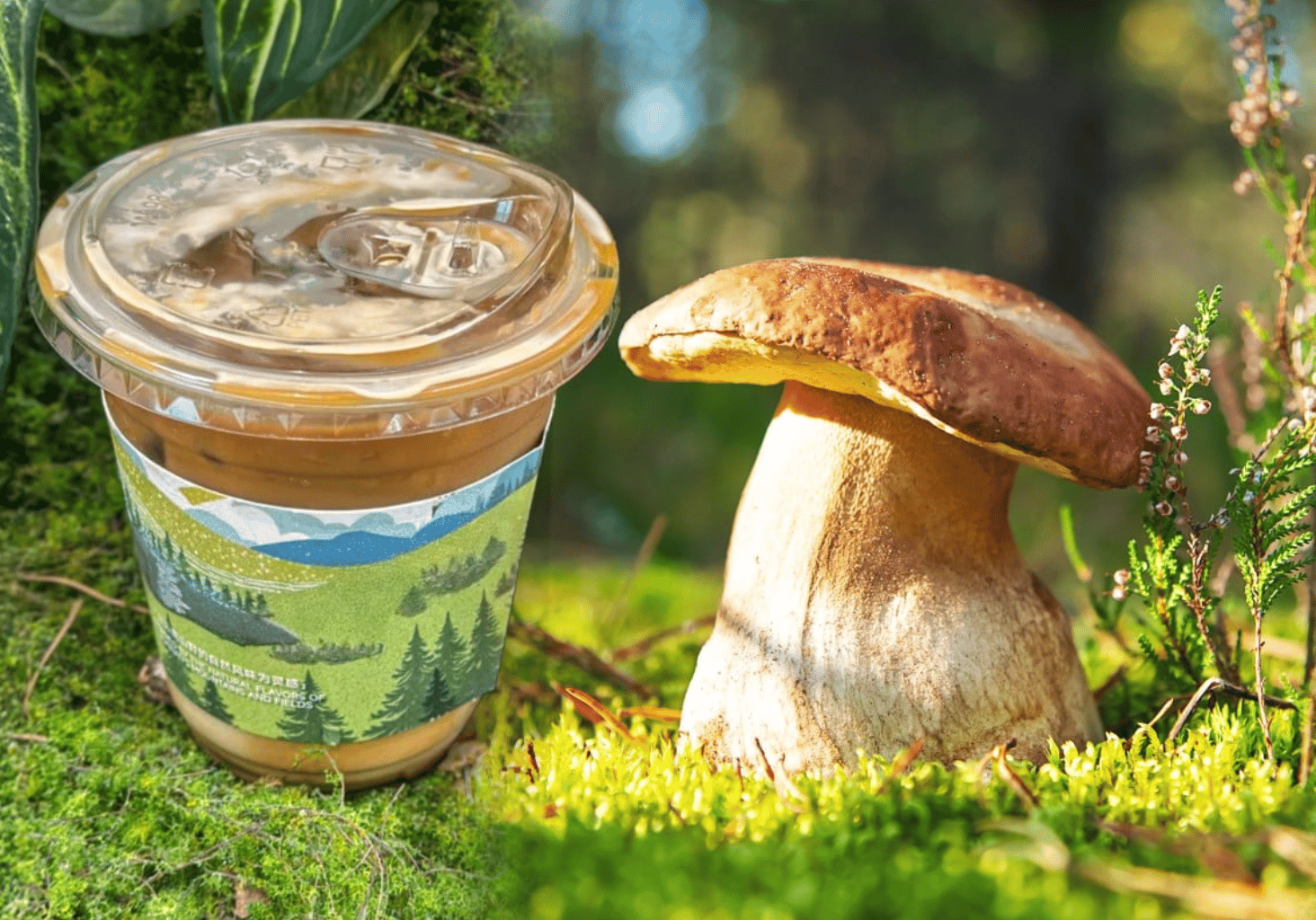
A cafe in China has launched a unique formulation of the popular mushroom coffee drink category with the launch of ‘Penny Bun Mushroom Coffee’
The Boletus edulus mushroom is known around the world as a culinary delight for its sweet, nutty, and meaty flavor alongside a creamy texture and earthy aroma, but this is the first time on record that it’s been incorporated into a beverage product and sold in an establishment.
The cafe is located in China’s Yunnan province, known as the #1 global hotspot for wild mushrooms. Yunnan has over 800 species of edible mushrooms that are foraged, bought, sold, and eaten, with 250 that are commonly consumed. Compare this to estimates of 25-30 species of wild mushrooms found in the U.S. and 10 or so that are commonly commercialized.
This is why it’s earned the nickname “The Mushroom Kingdom”.
Mushroom drinks in Asia are…something else. Here’s a video from TikTok of an American guy buying canned mushroom beer in Shashi, China:
And below is a picture of ‘Wood Ear Mushroom Juice’, something I’ve seen for sale at Asian markets in San Francisco.
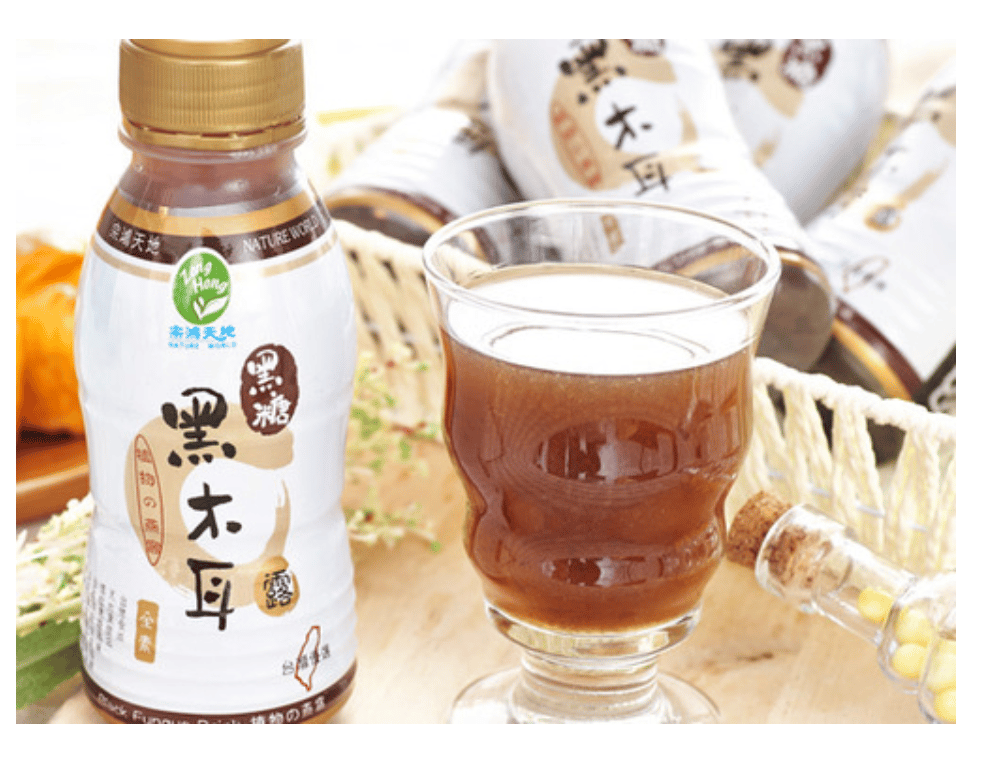
North Korea 🇰🇵 even has a ‘mushroom sports drink’ formulated to be “very effective in enhancing physical ability of sportspersons and recovering from their fatigue” as reported by The Guardian in 2014.
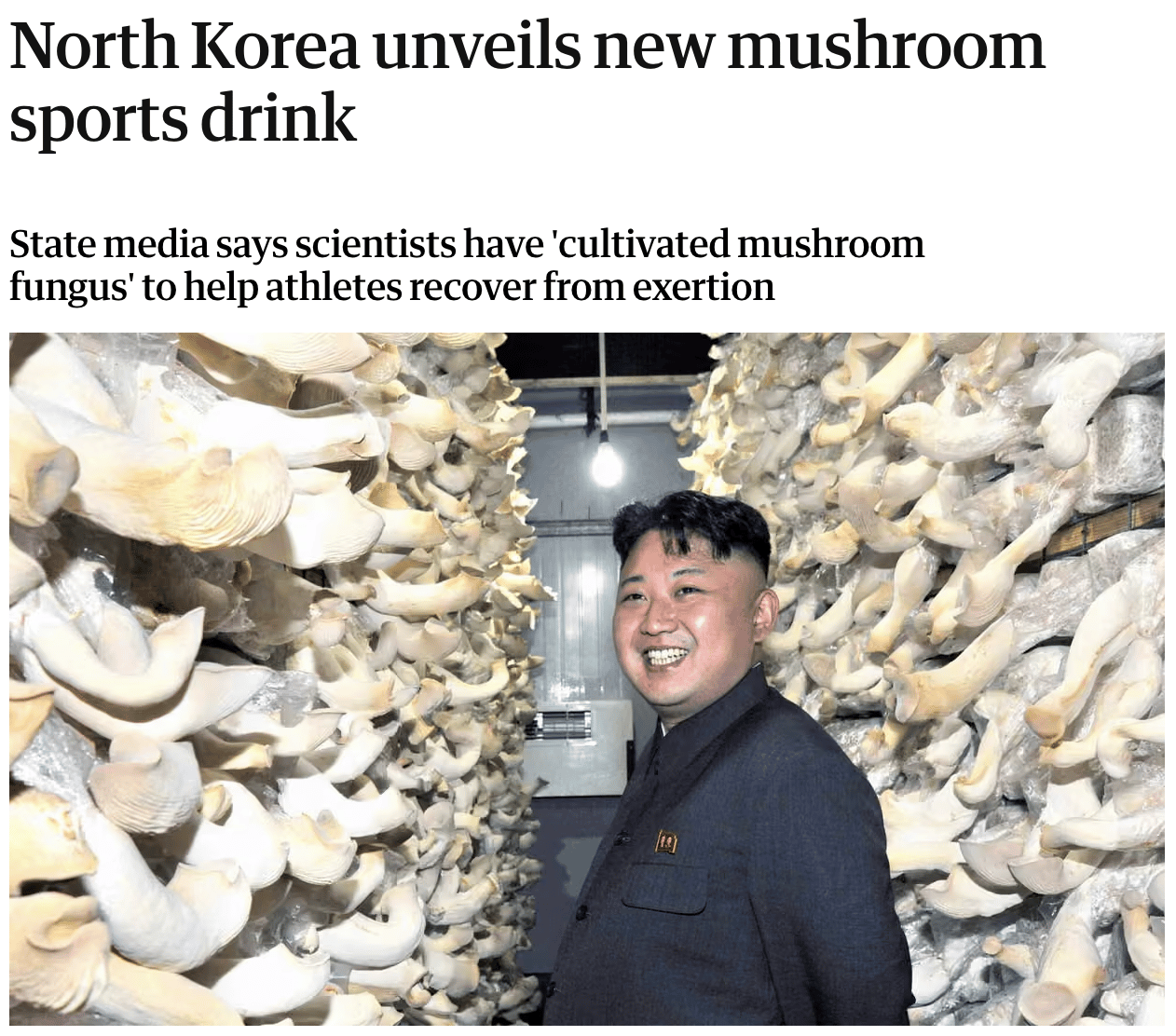
But if you think mushroom drinks are just an intriguing trend or category in the Far East…I’ve got news for you.
The mushroom drink category is exploding in the U.S. right now, and we’ve had the founders of some of the biggest ones on the Mycopreneur Podcast and at the weekly Mycopreneur Incubator.
Here are a few case studies of popular mushroom beverages sold DTC (Direct To Consumer) and in retail stores across the U.S.
MycoPop
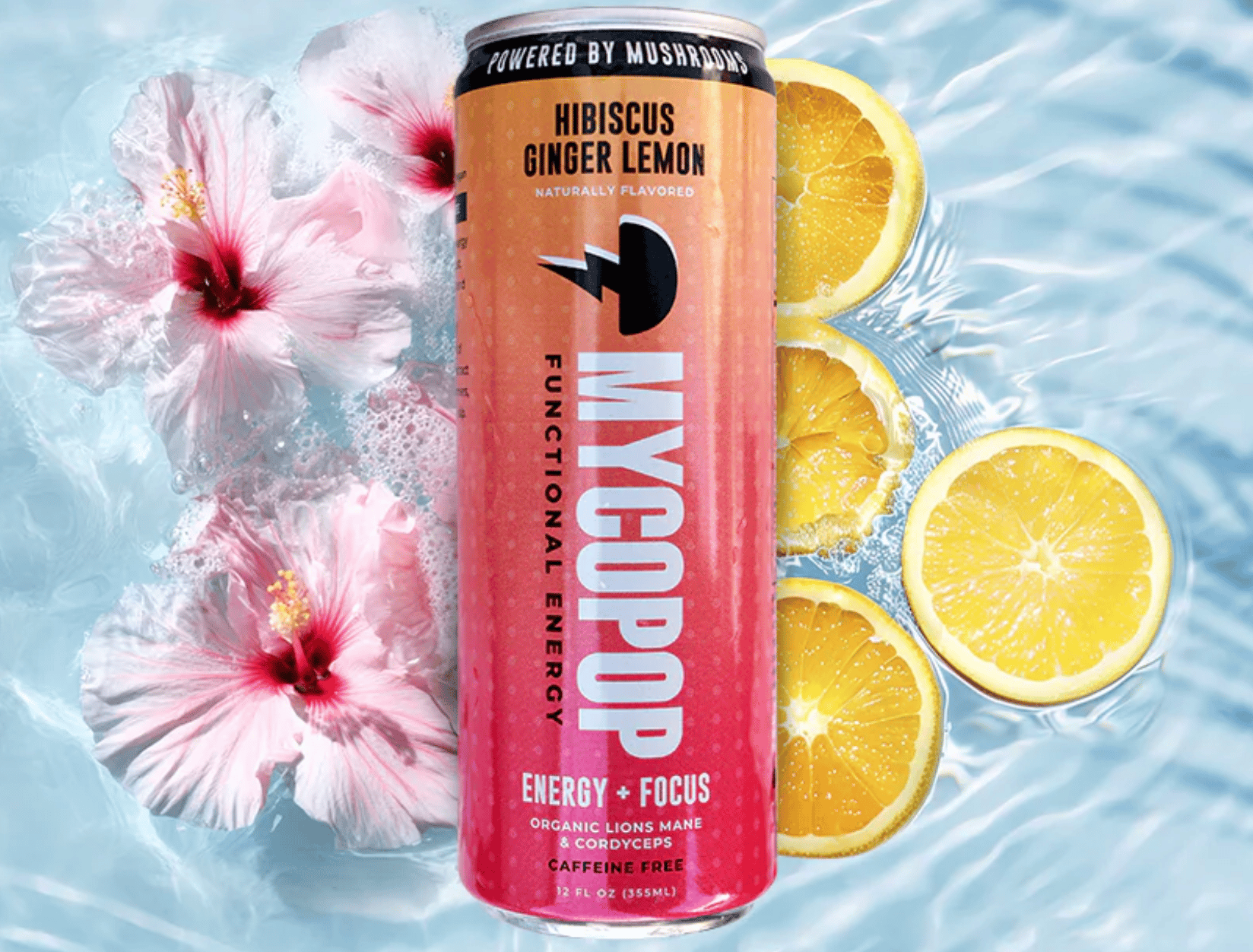
MycoPop is a functional energy beverage that incorporates organic, American-sourced Cordyceps & Lion’s Mane Mushroom Extracts into Appalachian Mountain Spring Water. The founder Allen Davies (@Allen_the_fun_guy on IG) has attended the Mycopreneur Incubator on multiple occasions and is ramping up distribution across multiple channels in the U.S. market as we speak.
Follow their adventures and snag some for yourself by hitting up the MycoPop website and following them @mycopop on Instagram. Fun fact, Mycopreneur friend and three time podcast guest William Padilla-Brown aka Mycosymbiote helped formulate this beverage.
BRĒZ
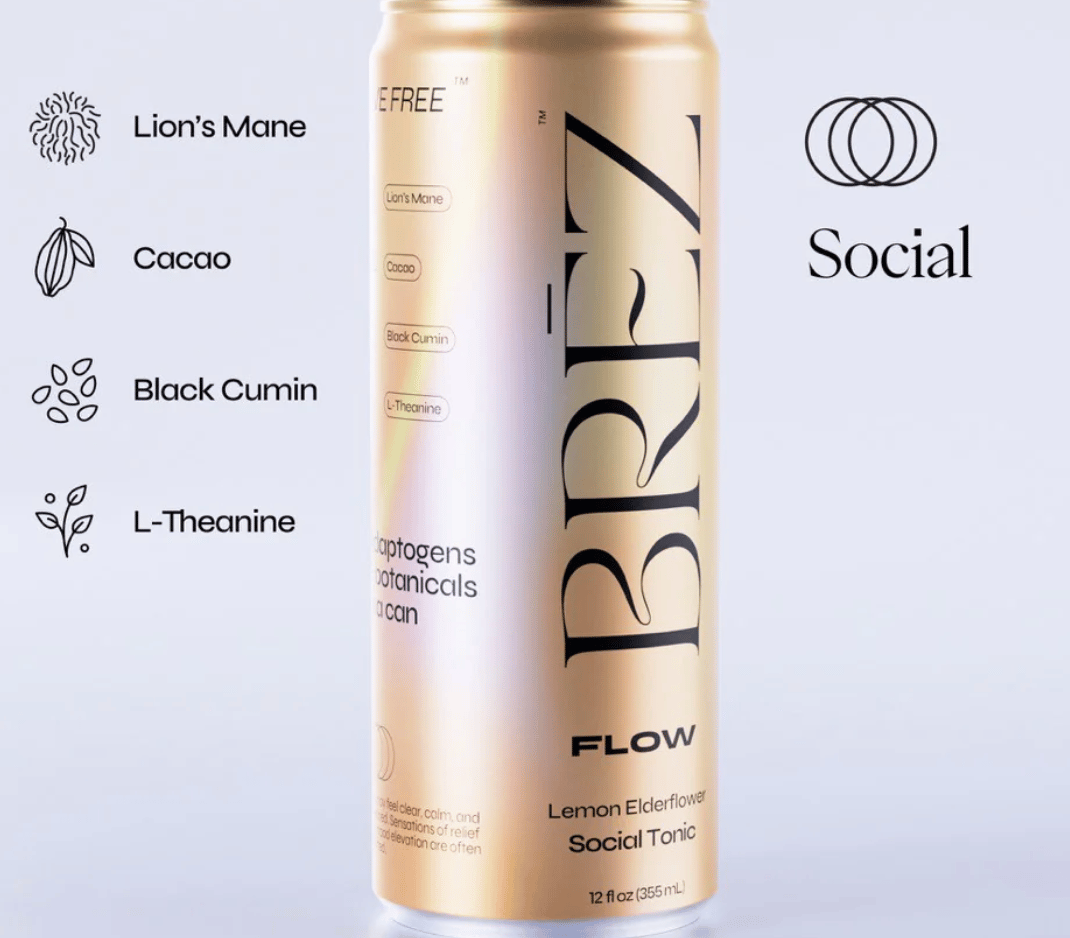
If you haven’t heard of BRĒZ by now, you’re probably living under a Macrolepiota. This powerhouse social tonic has recently been certified as the fastest growing beverage brand in the U.S. - Not just fastest growing mushroom or functional beverage brand, but fastest growing beverage brand period. They just eclipsed $60 million in revenue in their first two years as a company and recently launched nationwide in Sprouts grocery stores.
Another fun fact, I actually introduced the Founder & CEO of BRĒZ Aaron Nosbisch to their Head of Product Travis Duncan in 2023 three months before the company launched, and Aaron has publicly credited me as being instrumental to the founding of the brand. Here’s a video of Aaron on stage in Miami last year talking about the origin story of BRĒZ and giving me a couple shoutouts:
Mycroboost mushroom coffee is one of the category leaders in the most prolific niche of the functional mushroom beverage category, which is mushroom coffee.
The origins of mushroom coffee can be traced back to World War 2 when Finnish troops began cutting their meager coffee rations with Chaga (Inonotus Obliquus), which is aparasitic fungus that grows prolifically on Birch Trees in cold northern climates.
The Mycroboost formulation of mushroom coffee is noted for its inclusion of cocoa alongside a stack of fruiting body extracts including Lion’s Mane, Cordyceps, Reishi, Turkey Tail, and Chaga - a powerhouse blend that is easily has the best taste to health benefit ratio of any of the many mushroom coffees I’ve tried. Plus, they’ve been an official sponsor of Mycopreneur for three years continuously, putting weight behind this platform before as early adopters. And before you go saying 'I’m biased about this mushroom coffee…I’ve also had an 8-figure mushroom coffee brand sold in large retailers nationwide as a sponsor and opted to stick with Mycroboost as my #1 mushroom coffee and title sponsor.
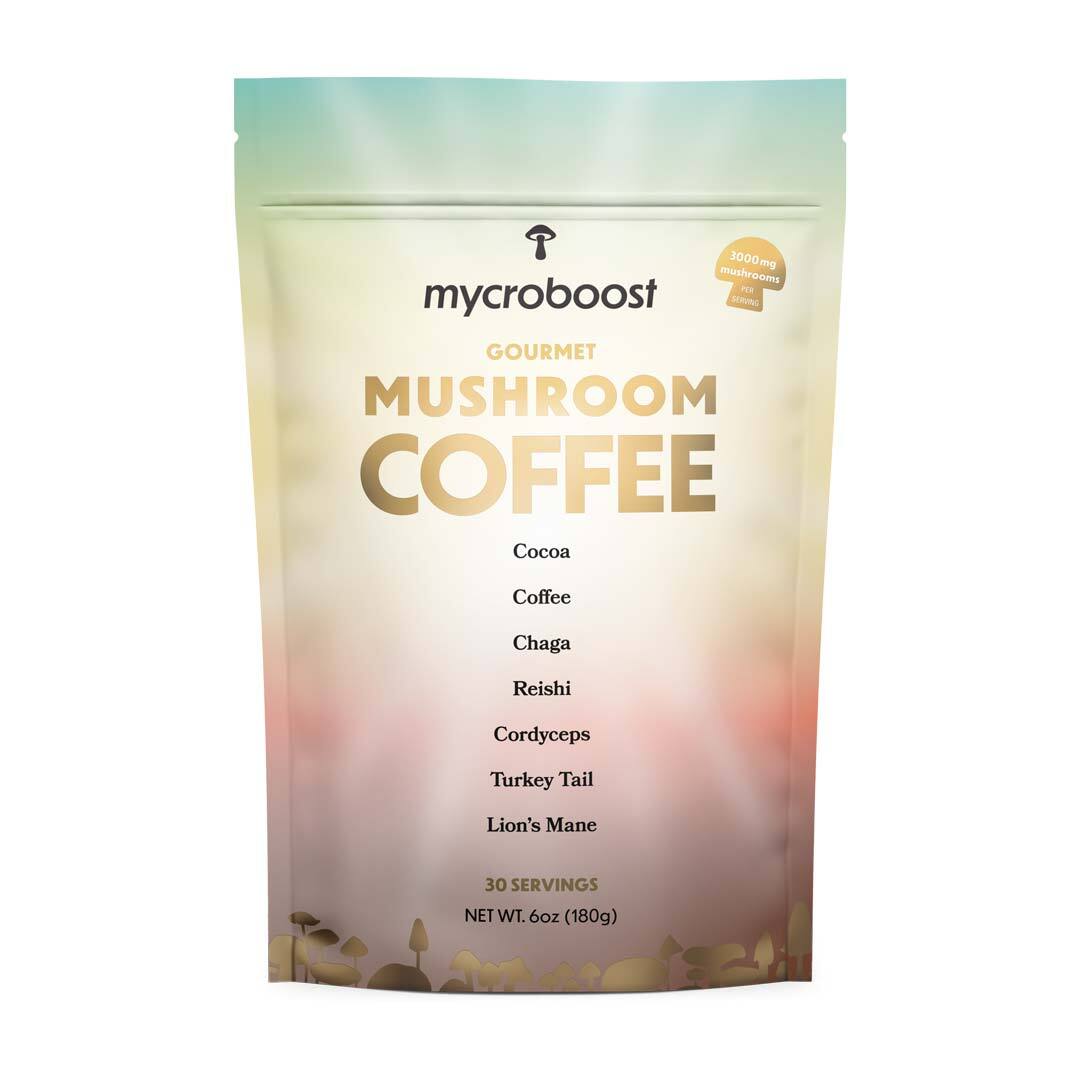
Mycopreneur Incubator
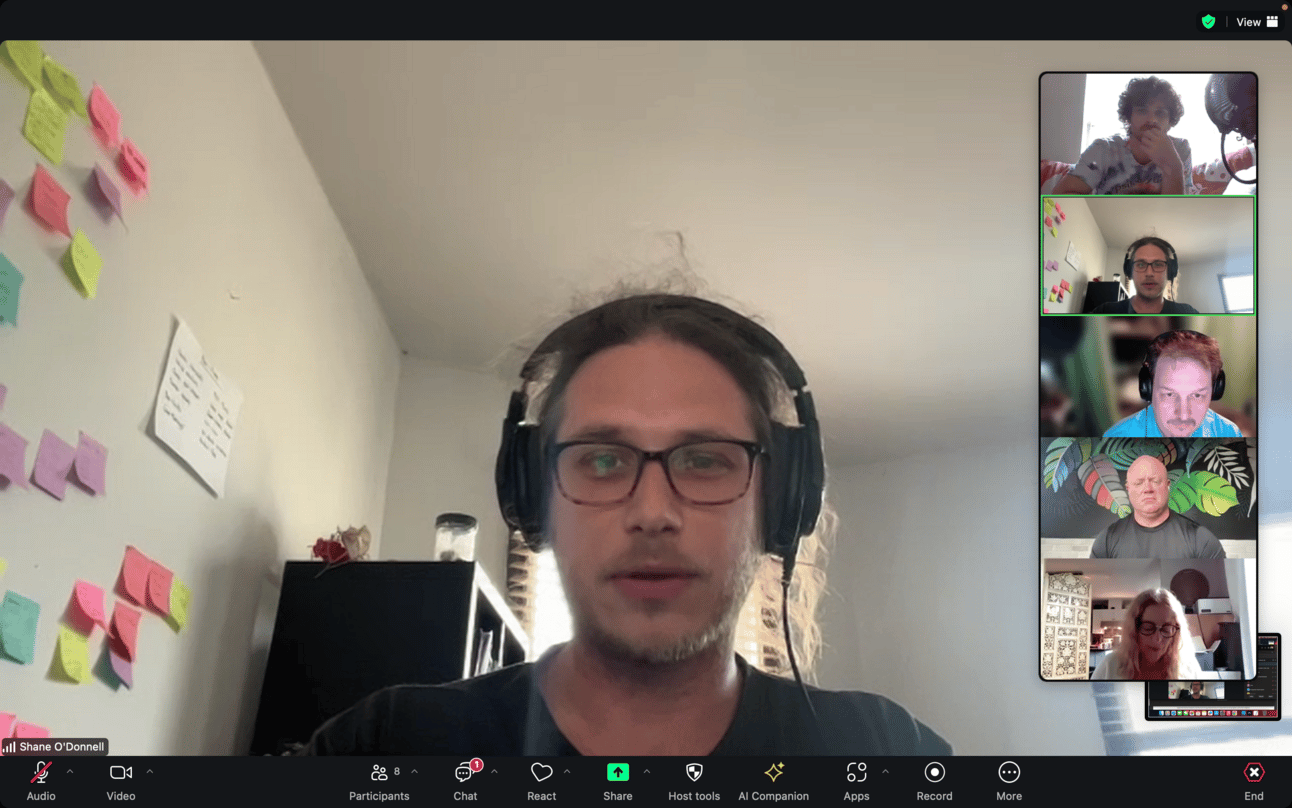
Shane from Heartwood Mushrooms in Canada at a previous Mycopreneur Incubator
Join us at today’s Mycopreneur Incubator, our weekly professional development and networking mushroom entrepreneur & business accelerator where you can connect directly with a robust community of emerging and established stakeholders in the global mushroom industry.
It’s free, but please consider making a financial contribution in the amount of your choice if you plan on attending or if you want to support the Mycopreneur platform at large. Venmo and details below.
Topic: Mycopreneur Incubator's Zoom Meeting
Today, Sep 18, 2025 3 pm ET / 12 pm PT
Join Zoom Meeting
Meeting ID: 839 3924 4746
Passcode: 659226
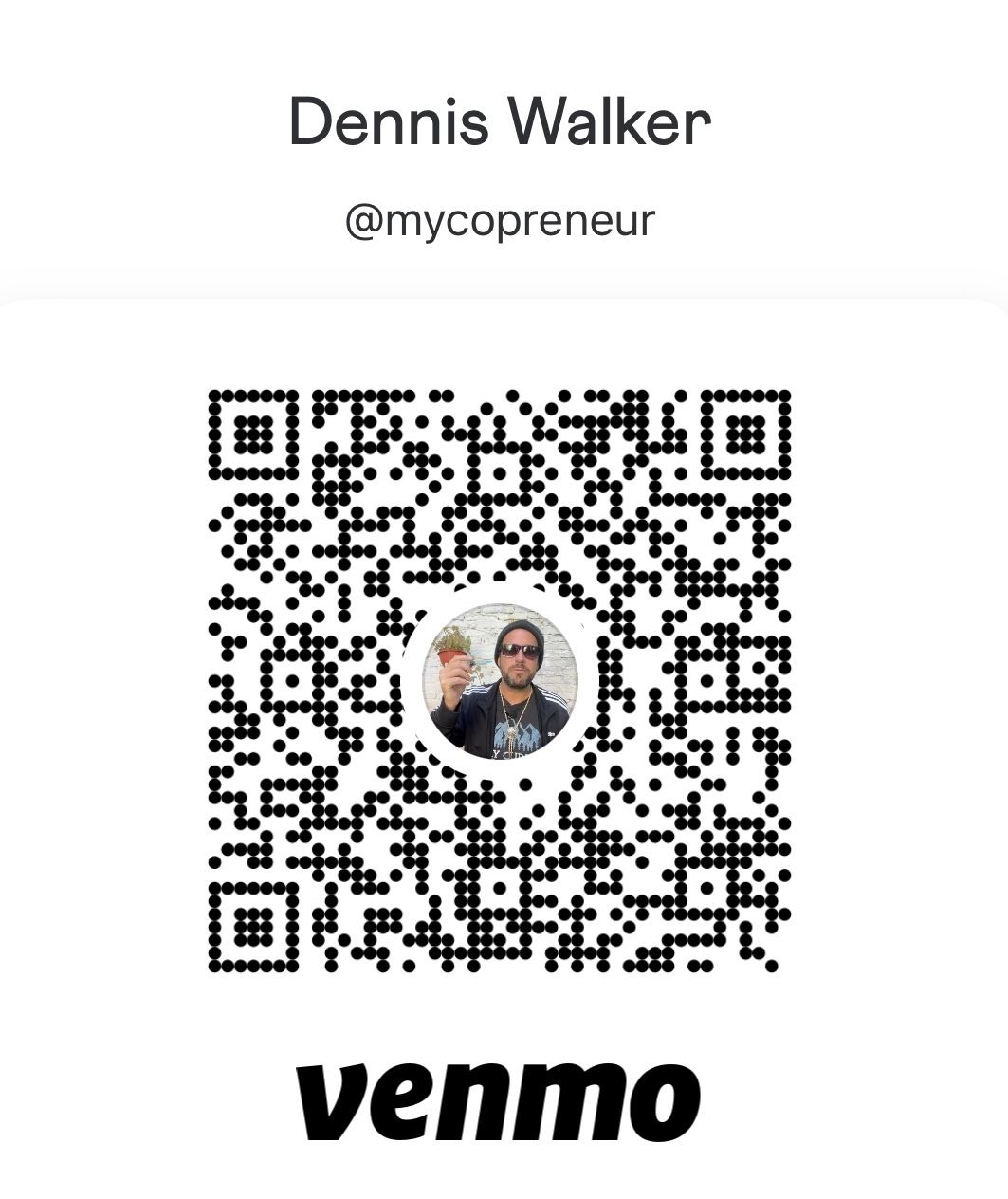
What did you think of this week’s Mycopreneur Newsletter? Please let me know in the replies.
Thanks for reading and see you at the Incubator today,
Dennis
